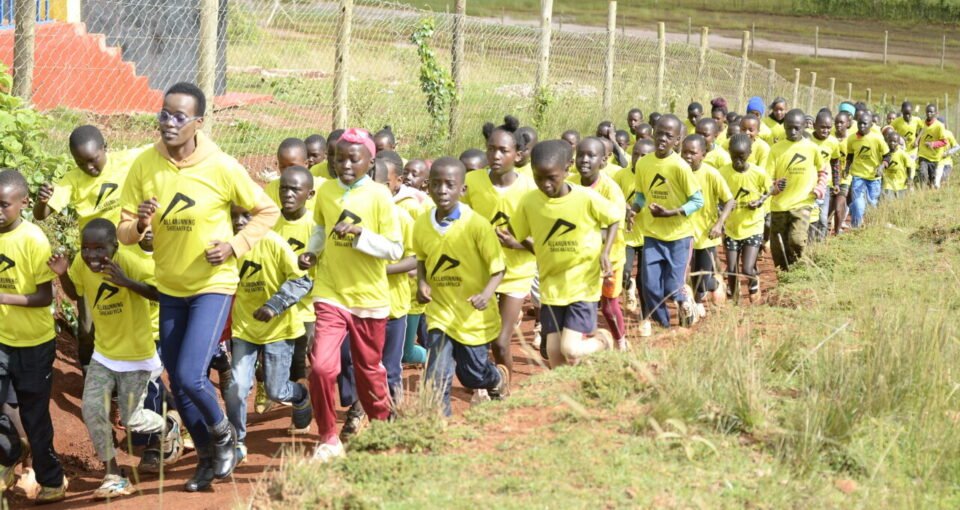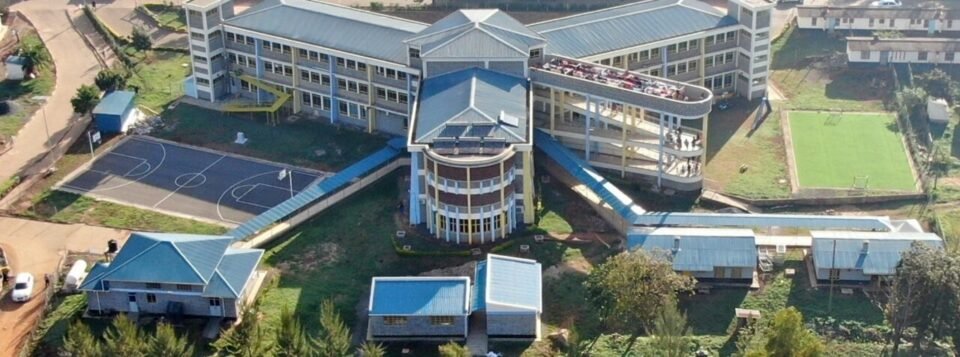Shoe4Africa Youth Development Organisation Supports Grassroots Running in Kenya
Will Ross, April 3, 2024

Kenya is well known for its high calibre running talent with a depth of ability only rivalled by neighbour Ethiopia. The success of the elite runners is largely thanks to the mass appeal of the sport and the emphasis on running from a running age. Schools and clubs are abundant, including charity-run projects like Shoe4Africa’s All4Running programme.
Shoe4Africa is a Kenya-based non-profit organization improving the lives of children in Africa. Founded in 1995 by former professional athlete Toby Tanser, Shoe4Africa’s programmes address healthcare, education and sports for young people. The existing hospital is located off Kenya’s main Nairobi-to-Uganda highway (Google Maps), 20 miles from HATC international sports camp in Iten.
A latest development is the construction of sub-Saharan Africa’s first children’s cancer hospital which is expected to open in 2025. Their youth runners have also competed at the highest level, with a Sudanese refugee and Shoe4Africa alum Perina Lokure Nakang recently racing in the World Cross-Country in Belgrade as part of the World Athletics Athlete Refugee Team (ART).
In this interview, Tanser outlines the remarkable Shoe4Africa’s journey and the milestones achieved.
What challenges do children face when accessing sport in Kenya?
The main issue that addresses children is the problem, the big problem, of poverty. Poverty is like a giant umbrella; underneath we have underfed kids, we have parents who need kids to work from the age of five or six be it tending to chickens, gardening, or collecting firewood. We have children going to public schools that don’t own any sports equipment, where there are few teachers – the games teacher likely won’t be on payroll. Poverty means that parents pressurise kids to pass exams and don’t spend time ‘playing’ sports. Poverty can be a lack of understanding that sport may be the best option for a child to pursue in order to change the trajectory of their life. I, for one, grew up with a choice of sports. That is not the case for the majority of kids in our large catchment area. They say talent is universal, and I have seen that Kenya has more than its fair share of talent, but they add that opportunities are not (universal). I agree with that sentiment.
What programmes / activities does S4A have, and how do you find young people to get involved?
We focus on Health, Education, and Empowerment. In our public hospital that treats over 430 patients a day, we offer daily practice of football on our astroturf all-weather pitch, as well as basketball on our court, and have ongoing bicycling training – all for kids. For example, at 11am children with disabilities will take their tricycles and hand-pedals carts onto the basketball court, using its even surface. We have elite athletes come and talk to the patients about the opportunities and importance of participating in sports for healing and wellbeing.
In our schools, we promote athletics and encourage kids to try to qualify for the county championships, which is often where they begin to gain recognition for their talent. As our six schools are each mentored by world famous athletes, who visit and encourage the kids, mentors who grew up in the same village as the school building, we find that kids don’t need much prompting to try out for sports. We often take visitors from abroad who might introduce a new game, or bring sports equipment like a volleyball net, which the kids always enjoy. Our list of school mentors goes as follows:
- Janeth Jepkosgei, world 800m champion, has the Shoe4Africa Janeth Jepkoesgi School in her village.
- Martin Lel, world half marathon and 3x London & 2x NYC marathon champion has the Shoe4Africa Martin Lel school in his village.
- Moses Kiptanui, 3x world steeplechase champion, multi former world record holder, has the Shoe4Africa Moses Kiptanui school in his birth village.
- Sally Kipyego, Olympic & World Championship Silver 10,000m, has the Shoe4Africa Sally Kipyego school in her home village.
- Mary Keitany, World Marathon record holder, world champion, 4x NYC and 3x London Marathon winner, has the Shoe4Africa Mary Keitany school in the village where she was born.
- Benson Kipruto (4th fastest marathoner of all time), Evans Chebet (NYC and double Boston marathon winner), Amos Kipruto (London marathon winner), and Vincent Kipchumba (Amsterdam & Vienna marathon winner) all mentor a classroom at the Shoe4Africa All4Running school in their neighbouring area.
We also have a boys & girls club which is situated right in the heart of Iten town on the town’s green field. Here 120-kids from differing schools come for afterschool programs, running training (we have worldclass coaches), and mentors. For example, Emmaculate Anyongo, who just ran the second fastest 10km ever, 28-mins) mentors the kids giving them hands on guidance, as does the world record holder Mary Keitany. We also bring in other experts to talk to the kids from differing fields of expertise.
In total, how many youth have benefitted in some way from the S4A activities? When did you start?
We started in 1995, we would encourage kids and women to participate in sports events offering them free t-shirts, prize money and shoes for those who signed up. In 2007/8, we held peace events with sports getting kids from warring tribes to play games together to teach unity. We have brought over thousands upon thousands of gently used running shoes to gift kids who wanted to change their lives through sports. Take for example the boy who wanted to start running, we gave him the facilities and a coach, and a few years later he became a world champion. The aforementioned Mary Keitany ran her first senior race in one of our development races finishing 21st place, one spot out of the prize money. Mary stated that would be her last race where she would fail to make money, and true to her word, it was, from that day on her professional career was launched.

What achievements are you most proud of?
Building East & Central Africa’s first public children’s hospital. A project that took seven years to complete. My first donation was $200 from a friend called Marty Levine! I started from scratch, learned much, negotiated with the Kenyan Government, hired a team, raised the money, even ran from Mombasa to the top of Mt. Kilimanjaro, but eventually I got it done. Since opening on Aug 12th, 2015, we have treated over 1.3 million kids.
Starting a project that will, in 2025, become the largest centre on the continent for treating the sick child. The Shoe4Africa Children’s Health Village will treat over 700-patients on a daily basis and will be made up of three hospitals (two that we are constructing right now) and be a one-stop shop for kid’s health.
Building sub-Saharan Africa’s first children’s cancer hospital. Currently, according to the stats, 9/10 kids diagnosed with cancers in this vast region are tragically dying. In 2018, WHO called this a health crisis, yet since then although think tanks and conferences has been a plenty, nobody has put two and two together and looked at the logical situation. In North America, those stats are reversed, 9/10 kids are surviving. And, 90% of those kids are treated in a children’s cancer hospital/center.
It is not rocket science but a question of access – if you build it, the patients will have a place to come. Winston Churchill states the greatest gift you can give a nation is a healthy population. Through sports, preventative health, and health centres, I am on a mission to make my mark on the Eastern African landscape.
What are you looking forward to in 2024-25 and what should we look out for in years to come?
Another idea that has worked well in America is the Ronald McDonald house. In 2025, we plan to bring our own version to Kenya to help mothers stay near their children. For our boys and girls club we are partnering with a foreign sports club to offer learning abroad for talented kids. Furthermore, we will be addressing one of the major issues for kids, especially kids wishing to get into sports, and starting the Porridge Club.
This is based on nutritional case studies: Two public schools ran a survey in Iten town, reporting that 90% did not have breakfast of solid food. 30% had a cup of tea for ‘breakfast.’ That means that 70% of kids are skipping breakfast through poverty. This means four hours of sitting with no learning waiting for the lunch break. It is impossible to give your best in physical education classes, or even learn, when you are thinking about nothing more than food. So, the Porridge Club will offer a free breakfast to the kids of the town. In short, we have much to look forward to in 2025!
Learn more and donate at shoe4africa.org